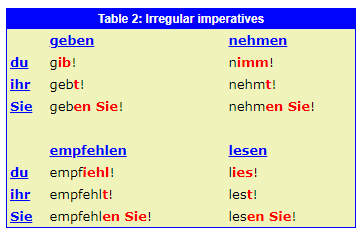As we have seen when looking at the present tense, there are a number of irregular or 'strong' verbs with a stem vowel in "-e-" in the stem change this to "-i-" or "-ie-" in the "du" form on the present tense. These strong verbs also retain this vowel change in the "du" imperative. Such verbs never add the ending "-e" in the "du" form. The "ihr" and "Sie" forms remain unaffected by this vowel change.

Note however that this vowel change in the "du" imperative is only true for those verbs with a stem vowel in "-e-" that changes to "-i-" or "-ie-". Verbs that make other vowel changes in the "du" form of the present tense do not retain this vowel change in the imperative. For example:
The verb "fahren" has the "du" imperative fahr! (and not: fähr), although the present tense of the verb is du fährst.
The verb "tragen" has the "du" imperative trag! (and not: träg), although the present tense of the verb is du trägst.
The verb "laufen" has the "du" imperative lauf! (and not: läuf), although the present tense of the verb is du läufst.
The verb "stoßen" has the imperative stoß! (and not: stöß), although the present tense of the verb is du stößt
The "wir" imperative
There is also a "wir" form of the imperative which equates to "Let's do something" rather than being an order. Just like the "Sie" form of the imperative, you merely take the normal "wir" form of the present tense verb and follow it with the pronoun, which cannot be omitted. Any separable prefix will come at the end of the clause.
"Gehen wir!" (= "Let's go!")
"Spielen wir!" (= "Let's play!")
"Lesen wir!" (= "Let's read!")
"Fangen wir jetzt an!" (= "Let's start now!")
The imperative forms of "sein"
The verb "to be" shows irregularity in the imperative in that all of its forms use "sei-" as a stem. This means that the "wir" and "Sie" forms of the imperative are different from the present tense forms of the verb.
"Sei glücklich!" (= "Be happy!")
"Seien wir optimistisch!" (= "Let's be optimistic!")
"Seid pünktlich!" (= "Be punctual!")
"Seien Sie glücklich!" (= "Be happy!")  英语
英语 日语
日语 韩语
韩语 法语
法语 西班牙语
西班牙语 意大利语
意大利语 阿拉伯语
阿拉伯语 葡萄牙语
葡萄牙语 越南语
越南语 俄语
俄语 芬兰语
芬兰语 泰语
泰语 丹麦语
丹麦语 对外汉语
对外汉语

